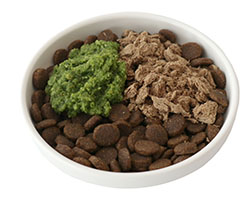Yes, you can add protein powder to your dog’s food, but it is important to consult with a veterinarian first to ensure it is safe and appropriate for your specific dog’s dietary needs and health conditions. Protein powder can provide additional nutrients and support muscle growth, but it should be used in moderation and as part of a balanced diet.
We will explore the benefits and potential risks of including protein powder in your dog’s meals, as well as offer some guidelines for proper usage to ensure the optimal health and well-being of your furry friend.
The Benefits Of Adding Protein Powder To Your Dog’S Diet
Adding protein powder to your dog’s food can bring several benefits. Firstly, it can improve muscle development and maintenance, ensuring your furry friend stays strong and healthy. Additionally, protein powder can enhance energy levels, giving your dog the vitality they need for an active lifestyle.
Moreover, it can aid in weight management, helping to maintain a healthy body weight and prevent obesity. By including protein powder in your dog’s diet, you can provide them with the essential nutrients they require for optimal health. So, next time you’re wondering if you can add protein powder to your dog’s food, the answer is a resounding yes! Just make sure to consult with your veterinarian beforehand to ensure it’s suitable for your dog’s specific needs.
Factors To Consider Before Adding Protein Powder To Your Dog’S Food
Before deciding to add protein powder to your dog’s food, it is essential to consult with a veterinarian. Understanding your dog’s specific dietary needs is crucial in ensuring their overall health. Consider factors such as their age, breed, and any existing health conditions.
When choosing a protein powder, opt for one that is specifically formulated for dogs. Look for high-quality, easily digestible ingredients. Avoid protein powders that contain additives or artificial preservatives. Introduce the powder gradually into your dog’s diet, monitoring for any adverse reactions.
Remember that protein powder should not replace a balanced diet, but rather supplement it. Always follow the recommended dosage guidelines provided by the manufacturer. By taking these factors into consideration, you can make an informed decision regarding protein powder for your furry friend’s food.
How To Incorporate Protein Powder In Your Dog’S Food
Protein powder can be a beneficial addition to your dog’s food, but it’s important to introduce it gradually and monitor their response. Start by determining the proper dosage based on your dog’s size and breed. Mix the protein powder with either wet or dry food to make it more appealing to your furry friend.
By slowly incorporating it into their meals over time, you can ensure that your dog tolerates the protein powder well and experiences its potential benefits. It’s crucial to pay attention to any changes in their digestion or behavior during this process.
Remember, the gradual introduction and careful monitoring of your dog’s response are key when adding protein powder to their food.

Credit: www.allthebestpetcare.com
Alternative Protein Sources For Dogs
Protein powder is not recommended as a sole source of nutrients for dogs. Instead, focus on natural alternatives. Meat and fish are excellent protein sources, providing essential amino acids. If you prefer a vegetarian or vegan approach, there are options available like plant-based protein sources.
These can be added to your dog’s food to ensure a well-rounded diet. Homemade recipes can also be a great way to provide protein-rich meals for your dog. By combining ingredients such as lean meats, eggs, and vegetables, you can create homemade dog food that meets their protein needs.
Remember, always consult your vet before making any changes to your dog’s diet to ensure their overall well-being.
Potential Risks And Side Effects Of Protein Powder For Dogs
Protein powder is often used by humans to supplement their diets, but can it be safe for dogs? It’s important to be aware of the potential risks and side effects. One concern is digestive issues that can arise when dogs consume protein powder.
This can include symptoms like stomach upset, diarrhea, or even vomiting. Allergic reactions are another possible concern. Some dogs may have sensitivities or allergies to specific types of protein. This can lead to symptoms such as itching, hives, or difficulty breathing.
Additionally, excessive protein intake can be harmful to dogs. While protein is essential for their diet, too much can put strain on their kidneys and lead to health issues. Therefore, it’s important to consult with a veterinarian before adding protein powder to your dog’s food.
They can provide guidance on whether it’s suitable for your furry friend’s unique needs.
Conclusion
Adding protein powder to your dog’s food can be a beneficial way to enhance their diet and meet their nutritional needs. By providing high-quality protein, protein powder can support muscle development, promote healthy skin and coat, and boost their overall energy levels.
However, it is essential to exercise caution and consult with a veterinarian before adding protein powder to your dog’s food. Understanding the right dosage and type of protein powder that suits your dog’s specific needs is crucial to avoid any negative impacts on their health.
Additionally, remember that protein powder should never replace a balanced diet and should only be considered as a supplement. With proper research and guidance, incorporating protein powder into your furry friend’s meals can contribute to their overall well-being and ensure they receive the necessary nutrients for a happy and healthy life.
